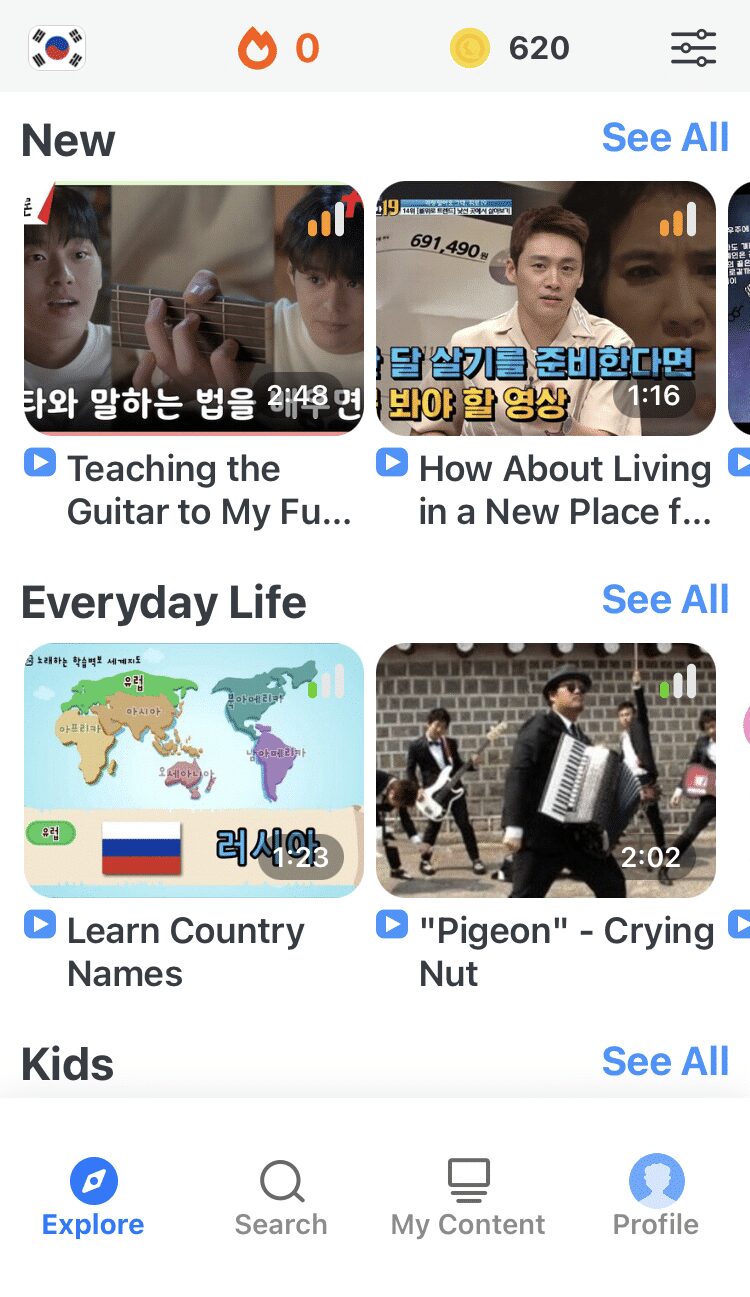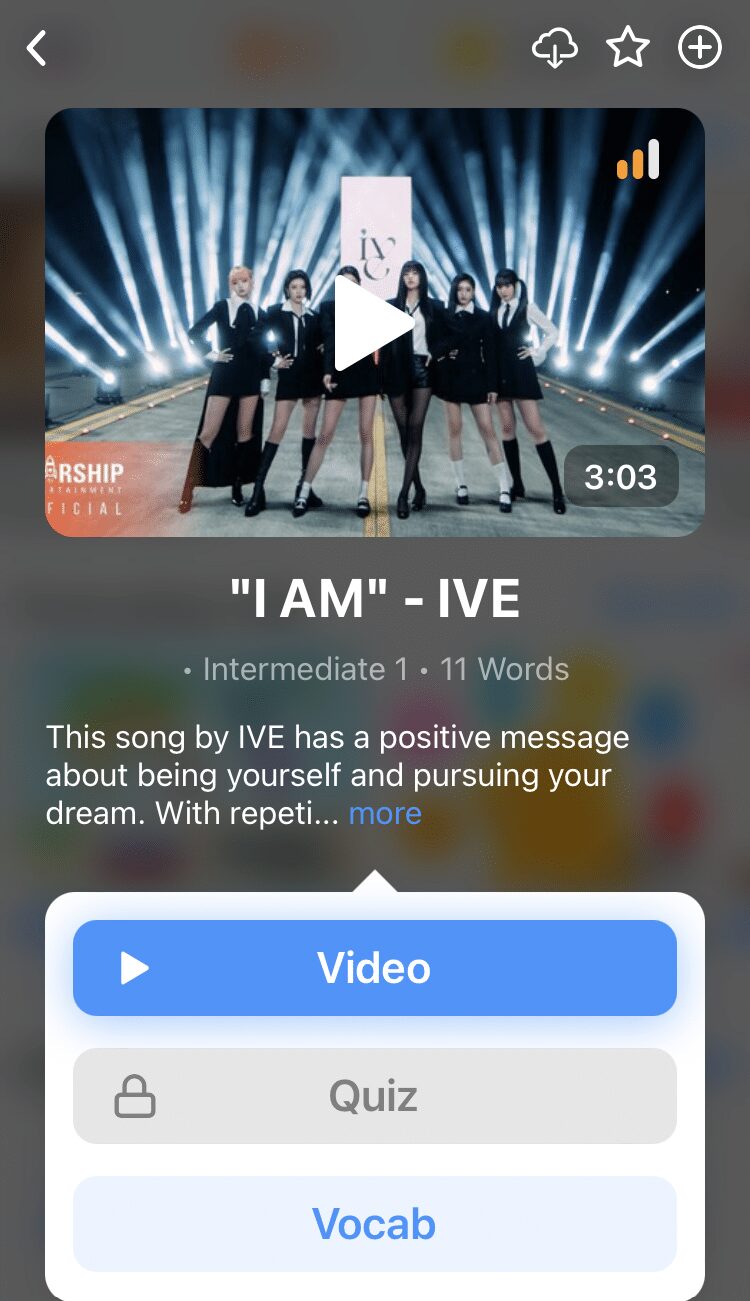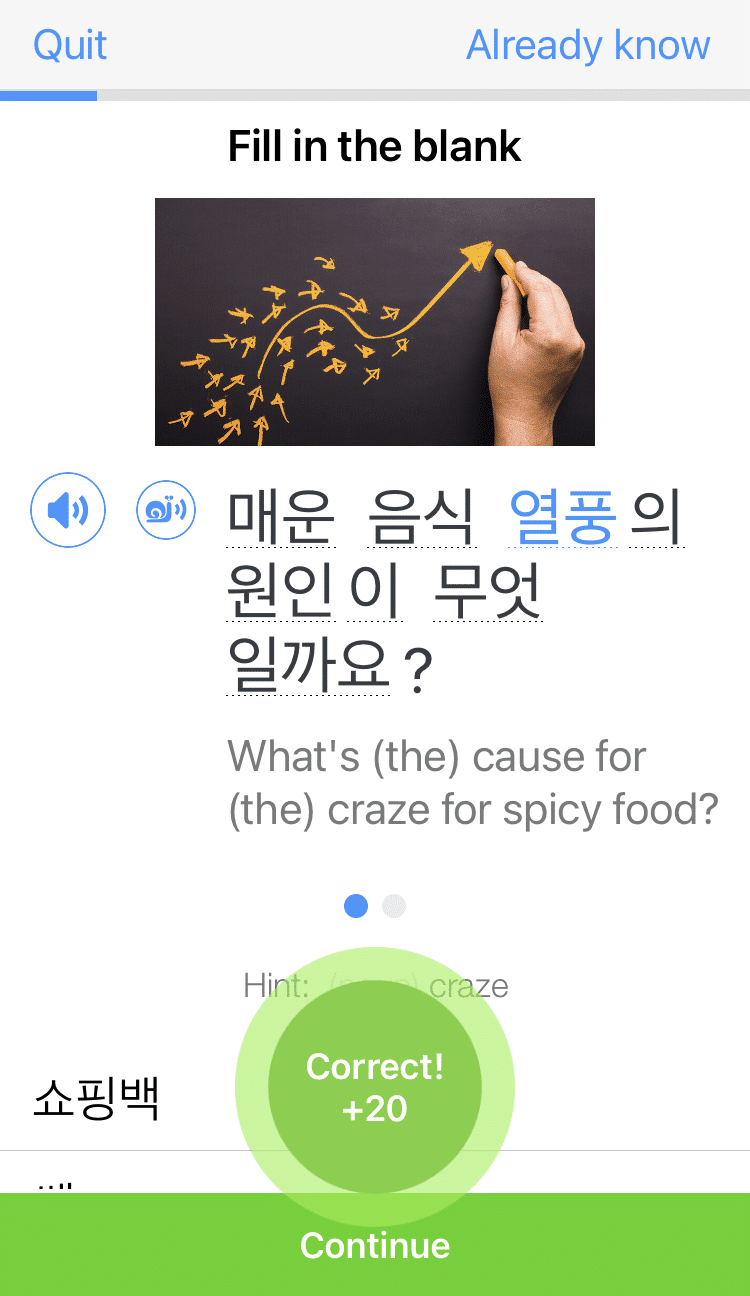The 300 Most Useful Korean Verbs

Verbs form the main part of the predicate of a sentence, making them a seriously important aspect of language, grammar and sentence-forming.
As a Korean language learner, you don’t need to learn all of the verbs at the beginner or intermediate level. But you should know at least a handful of common verbs.
Check out these 300 verbs below, which are simply ideal for beginner learners as an introduction to Korean verbs.
Download: This blog post is available as a convenient and portable PDF that you can take anywhere. Click here to get a copy. (Download)
Korean Action Verbs
Action verbs are words that describe physical actions or an activity that is happening. They’re also called dynamic verbs, which might help you remember better what they’re describing.
| Korean Verbs | Romanization | English |
|---|---|---|
| 가다 | ga-da | to go |
| 가져가다 | ga-jyeo-ga-da | to take |
| 걷다 | geod-da | to walk |
| 고르다 | go-leu-da | to choose |
| 놀다 | nol-da | to play |
| 노래하다 | no-lae-ha-da | to sing |
| 놓다 | noh-da | to put or to lay |
| 달리다 | dal-li-da | to run |
| 듣다 | deud-da | to listen |
| 떠나다 | tteo-na-da | to leave |
| 만나다 | man-na-da | to meet |
| 사다 | sa-da | to buy |
| 생각하다 | saeng-gak-ha-da | to think |
| 살다 | sal-da | to live |
| 쓰다 | sseu-da | to write |
| 앉다 | an-da | to sit down |
| 알다 | al-da | to know |
| 오다 | o-da | to come or to arrive |
| 요리하다 | yo-li-ha-da | to cook |
| 읽다 | ik-da | to read |
| 일어나다 | il-eo-na-da | to stand up |
| 일하다 | il-ha-da | to work |
| 자다 | ja-da | to sleep |
| 주다 | ju-da | to give |
| 즐기다 | jeul-gi-da | to enjoy |
| 찾다 | chat-da | to find or to look for |
| 먹다 | meok-da | to eat |
| 마시다 | ma-shi-da | to drink |
| 말하다 | mal-ha-da | to speak or to say |
| 보다 | bo-da | to see or to watch |
| 배우다 | bae-u-da | to learn |
| 웃다 | ut-da | to laugh |
| 울다 | ul-da | to cry |
| 기다리다 | gi-da-ri-da | to wait |
| 공부하다 | gong-bu-ha-da | to study |
| 팔다 | pal-da | to sell |
| 하다 | ha-da | to do |
| 해 보다 | hae bo-da | to try |
Korean Stative Verbs
Stative verbs are words that describe a certain state of being, such as a thought, feeling, opinion or appearance. They usually don’t describe doing anything in a physical sense.
| Korean Verbs | Romanization | English |
|---|---|---|
| 가지다 | ga-ji-da | to have or to own |
| 거짓말하다 | geo-jit-mal-ha-da | to lie |
| 기대하다 | gi-dae-ha-da | to expect or to look forward to |
| 기억하다 | gi-eok-ha-da | to remember |
| 느끼다 | neu-kki-da | to feel |
| 동의하다 | dong-ui-ha-da | to agree |
| 미워하다 | mi-weo-ha-da | to hate |
| 믿다 | mid-da | to believe |
| 사랑하다 | sa-rang-ha-da | to love |
| 생각하다 | saeng-gak-ha-da | to think |
| 상상하다 | sang-sang-ha-da | to imagine |
| 싫어하다 | shilh-eo-ha-da | to dislike or to hate |
| 좋아하다 | joh-a-ha-da | to like or to favor |
| 죄송하다 | joe-song-ha-da | to be sorry |
| 추측하다 | chu-cheuk-ha-da | to guess |
| 화나다 | hwa-na-da | to be angry |
| 알다 | al-da | to know |
| 알아보다 | al-a-bo-da | to recognize |
| 이해하다 | i-hae-ha-da | to understand |
| 의심하다 | ui-shim-ha-da | to suspect |
General Korean Verbs
| Korean Verbs | Romanization | English |
|---|---|---|
| 가다 | ga-da | to go |
| 가르치다 | ga-leu-chi-da | to teach |
| 가리다 | ga-li-da | to cover |
| 가리키다 | ga-li-ki-da | to point |
| 가져가다 | ga-jeo-ga-da | to take (away) |
| 가져오다 | ga-jeo-o-da | to bring |
| 가지다 | ga-ji-da | to have |
| 개방하다 | gae-bang-ha-da | to open |
| 걱정하다 | geok-jeong-ha-da | to worry |
| 걷다 | geod-da | to walk |
| 걸다 | geol-da | to hang up or to bet |
| 걸리다 | geol-li-da | to get caught |
| 걸어가다 | geol-eo-ga-da | to walk to |
| 걸어 놓다 | geol-eo noh-da | to hang up |
| 결혼하다 | gyeol-hon-ha-da | to marry |
| 경험하다 | gyeong-heom-ha-da | to experience |
| 고르다 | go-leu-da | to choose |
| 고치다 | go-chi-da | to fix |
| 공감하다 | gong-gam-ha-da | to empathize |
| 공부하다 | gong-bu-ha-da | to study |
| 관찰하다 | gwan-chal-ha-da | to observe |
| 구하다 | gu-ha-da | to obtain or to save |
| 굶다 | gum-da | to starve |
| 그만두다 | geu-man-du-da | to quit |
| 깨우다 | ggae-u-da | to wake someone up |
| 꿈꾸다 | kkum-kku-da | to dream |
| 끄다 | kkeu-da | to turn off |
| 끊다 | kkeun-da | to cut off or to quit |
| 끌다 | kkeul-da | to pull |
| 끌어당기다 | kkeul-eo-dang-gi-da | to pull or to attract |
| 끝나다 | kkeut-na-da | to end |
| 끝내다 | kkeut-nae-da | to finish |
| 나가다 | na-ga-da | to go out |
| 나누다 | na-nu-da | to divide |
| 나르다 | na-leu-da | to carry or to transport |
| 나오다 | na-o-da | to come out |
| 날다 | nal-da | to fly |
| 남다 | nam-da | to remain |
| 넘다 | neom-da | to exceed |
| 놀다 | nol-da | to play |
| 누르다 | nu-leu-da | to press |
| 눕다 | nub-da | to lie down |
| 느끼다 | neu-kki-da | to feel |
| 늘다 | neul-da | to increase |
| 늦추다 | neut-chu-da | to delay or to postpone |
| 넣다 | neoh-da | to put in |
| 넘어지다 | neom-eo-ji-da | to fall over |
| 넘어가다 | neom-eo-ga-da | to pass |
| 놓다 | noh-da | to let go |
| 닫다 | dad-da | to close |
| 달리다 | dal-li-da | to run |
| 담다 | dam-da | to put into |
| 담배를 피우다 | dam-bae-leul pi-u-da | to smoke a cigarette |
| 도와주다 | do-wa-ju-da | to help |
| 되다 | doe-da | to become |
| 돌아가다 | dol-a-ga-da | to return |
| 돌리다 | dol-li-da | to turn |
| 두다 | du-da | to put |
| 드러나다 | deu-leo-na-da | to be revealed |
| 들다 | deul-da | to carry |
| 들리다 | deul-li-da | to be heard |
| 들어가다 | deul-eo-ga-da | to enter |
| 떨어지다 | tteol-eo-ji-da | to fall |
| 떠나다 | tteo-na-da | to leave |
| 떨다 | tteol-da | to shake or to tremble |
| 떼다 | tte-da | to detach or to remove |
| 뛰다 | ttwi-da | to run |
| 뜨다 | tteu-da | to float |
| 마시다 | ma-si-da | to drink |
| 마음에 들다 | ma-eum-e deul-da | to like |
| 막다 | mak-da | to block |
| 말하다 | mal-ha-da | to speak |
| 만들다 | man-deul-da | to make |
| 만지다 | man-ji-da | to touch |
| 만족하다 | man-jok-ha-da | to be satisfied |
| 맡기다 | mat-gi-da | to entrust |
| 매다 | mae-da | to tie |
| 매달리다 | mae-dal-li-da | to cling |
| 메모를 하다 | me-mo-leul ha-da | to take a memo |
| 메시지를 보내다 | me-si-ji-leul bo-nae-da | to send a message |
| 메일을 보내다 | me-il-eul bo-nae-da | to send an email |
| 면접을 보다 | myeon-jeob-eul bo-da | to have a job interview |
| 모르다 | mo-leu-da | to not know |
| 모으다 | mo-eu-da | to collect |
| 목욕하다 | mok-yok-ha-da | to take a bath |
| 못하다 | mot-ha-da | to be bad at or to be unable to do |
| 모자를 쓰다 | mo-ja-leul sseu-da | to wear a hat |
| 무게를 달다 | mu-ge-leul dal-da | to weigh |
| 무릎을 꿇다 | mu-leup-eul kkulh-da | to kneel |
| 무시하다 | mu-si-ha-da | to ignore |
| 무서워하다 | mu-seo-weo-ha-da | to be scared of |
| 받치다 | bad-chi-da | to support or to prop |
| 발달하다 | bal-dal-ha-da | to develop |
| 발견하다 | bal-gyeon-ha-da | to discover |
| 발생하다 | bal-saeng-ha-da | to occur or to happen |
| 발음하다 | bal-eum-ha-da | to pronounce |
| 발표하다 | bal-pyo-ha-da | to present or to announce |
| 밝혀지다 | balg-hyeo-ji-da | to be revealed or to be disclosed |
| 버리다 | beo-li-da | to throw away |
| 벌다 | beol-da | to earn |
| 벗다 | beot-da | to take off (clothes) |
| 보내다 | bo-nae-da | to send |
| 보다 | bo-da | to see or to watch |
| 보이다 | bo-i-da | to be visible |
| 보여 주다 | bo-yeo ju-da | to show |
| 보호하다 | bo-ho-ha-da | to protect |
| 봉사하다 | bong-sa-ha-da | to volunteer |
| 부르다 | bu-leu-da | to call |
| 부탁하다 | bu-tak-ha-da | to request |
| 불다 | bul-da | to blow |
| 빌리다 | bil-li-da | to borrow or to lend |
| 빛나다 | bit-na-da | to shine |
| 빨래하다 | ppal-lae-ha-da | to do the laundry |
| 빼다 | ppae-da | to subtract |
| 뻗다 | bbeot-da | to stretch |
| 뽑다 | bbop-da | to pick or to select |
| 뽑아내다 | bbop-a-nae-da | to extract |
| 뿌리다 | bbu-ri-da | to sprinkle |
| 살다 | sal-da | to live |
| 사다 | sa-da | to buy |
| 쉬다 | shwi-da | to rest |
| 쓰다 | sseu-da | to write |
| 씻다 | ssit-da | to wash |
| 싸우다 | ssa-u-da | to fight |
| 실례하다 | sil-lye-ha-da | to excuse oneself |
| 시작하다 | si-jak-ha-da | to start |
| 식다 | sig-da | to cool down |
| 신다 | sin-da | to put on (shoes) |
| 신청하다 | sin-cheong-ha-da | to apply |
| 싫어하다 | silh-eo-ha-da | to dislike |
| 심다 | sim-da | to plant |
| 썩다 | sseok-da | to rot |
| 쓰다 | sseu-da | to write |
| 쓰러지다 | sseu-leo-ji-da | to collapse or to faint |
| 씹다 | ssip-da | to chew |
| 앉다 | an-da | to sit |
| 알다 | al-da | to know |
| 애쓰다 | ae-sseu-da | to try hard |
| 양보하다 | yang-bo-ha-da | to yield |
| 양해하다 | yang-hae-ha-da | to understand or to excuse |
| 어울리다 | eo-ul-li-da | to suit or to fit |
| 없다 | eob-da | to not exist or to not have |
| 없애다 | eobs-ae-da | to get rid off |
| 여행하다 | yeo-haeng-ha-da | to travel |
| 연습하다 | yeon-seup-ha-da | to practice |
| 연락하다 | yeol-lak-ha-da | to contact |
| 열다 | yeol-da | to open |
| 열리다 | yeol-li-da | to be opened |
| 오다 | o-da | to come |
| 올라가다 | ol-la-ga-da | to go up or to climb |
| 올라오다 | ol-la-o-da | to come up |
| 올라타다 | ol-la-ta-da | to get on |
| 외우다 | oe-u-da | to memorize |
| 외출하다 | oe-chul-ha-da | to go out |
| 외치다 | oe-chi-da | to shout |
| 자다 | ja-da | to sleep |
| 잡다 | jab-da | to catch |
| 저지르다 | jeo-ji-leu-da | to commit |
| 저장하다 | jeo-jang-ha-da | to save (data) |
| 전하다 | jeon-ha-da | to convey or to transmit |
| 절약하다 | jeol-yag-ha-da | to save or to conserve |
| 접다 | jeob-da | to fold |
| 접근하다 | jeob-geun-ha-da | to approach |
| 젓다 | jeot-da | to stir or shake |
| 정리하다 | jeong-li-ha-da | to organize or to summarize |
| 정비하다 | jeong-bi-ha-da | to maintain or to repair |
| 정신을 차리다 | jeong-sin-eul cha-ri-da | to pull oneself together or to regain consciousness |
| 제공하다 | je-gong-ha-da | to provide |
| 제대로 하다 | je-dae-lo ha-da | to do properly |
| 제자리에 서다 | je-ja-li-e seo-da | to stand still |
| 제출하다 | je-chul-ha-da | to submit |
| 제한하다 | je-han-ha-da | to restrict |
| 조각하다 | jo-gak-ha-da | to carve or to sculpt |
| 조립하다 | jo-lib-ha-da | to assemble |
| 조사하다 | jo-sa-ha-da | to investigate |
| 조언하다 | jo-eon-ha-da | to advise |
| 조정하다 | jo-jeong-ha-da | to adjust |
| 졸다 | jol-da | to doze |
| 종료하다 | jong-lyo-ha-da | to finish or to wrap up |
| 찍다 | jjik-da | to stamp |
| 찢다 | jjit-da | to tear |
| 차다 | cha-da | to kick |
| 차별하다 | cha-byeol-ha-da | to discriminate |
| 차단하다 | cha-dan-ha-da | to block |
| 찾다 | chat-da | to find or to look for |
| 참석하다 | cham-seok-ha-da | to participate |
| 청소하다 | cheong-so-ha-da | to clean |
| 축하하다 | chuk-ha-ha-da | to congratulate |
| 출발하다 | chul-bal-ha-da | to depart |
| 춤추다 | chum-ha-da | to dance |
| 취소하다 | chwi-so-ha-da | to cancel |
| 켜다 | kyeo-da | to turn on |
| 키우다 | ki-u-da | to raise or to bring up |
| 타다 | ta-da | to ride or to burn |
| 태우다 | tae-u-da | to give a ride or to burn |
| 태어나다 | tae-eoh-na-da | to be born |
| 털다 | teol-da | to shake off |
| 토하다 | to-ha-da | to vomit |
| 틀리다 | teul-li-da | to be incorrect or to be wrong |
| 틀다 | teul-da | to twist |
| 팔다 | pal-da | to sell |
| 펴다 | pyeo-da | to open or to spread |
| 펼치다 | pyeol-chi-da | to unfold |
| 포기하다 | po-gi-ha-da | to give up |
| 포함하다 | po-ham-ha-da | to include |
| 풀다 | pul-da | to solve or to untie |
| 피다 | pi-da | to bloom |
| 필요하다 | pil-yo-ha-da | to need |
| 하다 | ha-da | to do |
| 향하다 | hyang-ha-da | to face or to head towards |
| 해결하다 | hae-gyeol-ha-da | to resolve |
| 확인하다 | hwag-in-ha-da | to confirm or to check |
| 헤매다 | he-mae-da | to wander |
| 헤어지다 | he-eo-ji-da | to part, to separate |
| 호응하다 | ho-eung-ha-da | to respond |
| 회복하다 | hoe-bok-ha-da | to recover |
| 후회하다 | hu-hoe-ha-da | to regret |
| 흔들다 | heun-deul-da | to shake |
| 흐르다 | heu-leu-da | to flow |
| 흘리다 | heul-li-da | to spill |
| 흩어지다 | heut-eo-ji-da | to scatter |
Korean Modal Verbs
Modal verbs are helping words that pair with other verbs to describe possibility or necessity.
| Korean Modal Verbs | Romanization | English |
|---|---|---|
| 할 수 있다 | hal su it-da | can |
| 해야 하다 | hae-ya ha-da | must |
| 해도 되다 | hae-do doe-da | may |
| 할 것이다 | hal goes-i-da | will |
In English, they usually go in front of the verb. In Korean, they often appear at the very end of a sentence and need to be attached to a conjugated action verb or stative verb. For the examples above, the word “to do” or 하다 is used.
How to Practice Korean Verbs
To practice all of these Korean verbs, it’s really helpful to hear and see how they’re actually used in context by native speakers. You can do this with a language learning program like FluentU.
FluentU takes authentic videos—like music videos, movie trailers, news and inspiring talks—and turns them into personalized language learning lessons.
You can try FluentU for free for 2 weeks. Check out the website or download the iOS app or Android app.
P.S. Click here to take advantage of our current sale! (Expires at the end of this month.)
Here’s a video from our YouTube channel to show you how you can learn verbs through the program:
If you need a refresher on how to conjugate the verbs, check out the video below. You can also check out this post for more information on Korean verb conjugation.
Sure, you’ll need to really master grammar concepts in order to speak Korean fluently one day. But knowing a handful of Korean verbs can help you fill in the blanks in conversations in the meantime.
Good luck and 공부 열심히 하세요! (gong-bu yeol-shi-mi ha-se-yo) — Study hard!
Download: This blog post is available as a convenient and portable PDF that you can take anywhere. Click here to get a copy. (Download)
And One More Thing...
If you enjoyed this post, you're already halfway to having the time of your life learning Korean with FluentU!
FluentU makes it possible to learn with K-pop videos, funny commercials, entertaining web series and more. Just a quick look will give you an idea of the variety of FluentU videos on offer:

FluentU really takes the grunt work out of learning languages, leaving you with nothing but engaging, effective and efficient learning. It's already hand-picked the best videos for you (which are organized by level and topic), so all you have to do is simply choose any video that strikes your fancy to get started.
Each word in the interactive captions comes with a definition, audio, image, example sentences and more.

Access a complete interactive transcript of every video under the Dialogue tab, and easily review words and phrases from the video under Vocab.

You can use FluentU’s unique Quiz Mode to learn the vocabulary and phrases from the video through fun questions.

FluentU keeps track of what you're learning, and tells you exactly when it's time for review, giving you a 100% personalized experience.
Review sessions use video context to help embed the words in your memory.
Start using the FluentU website on your computer or tablet or, better yet, download the FluentU app from the iTunes or Google Play store. Click here to take advantage of our current sale! (Expires at the end of this month.)








